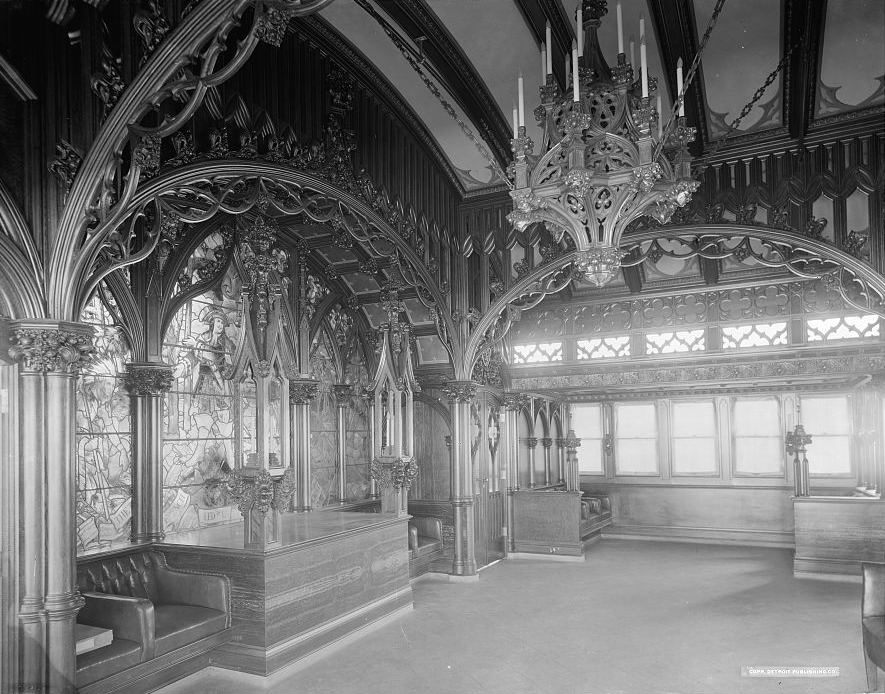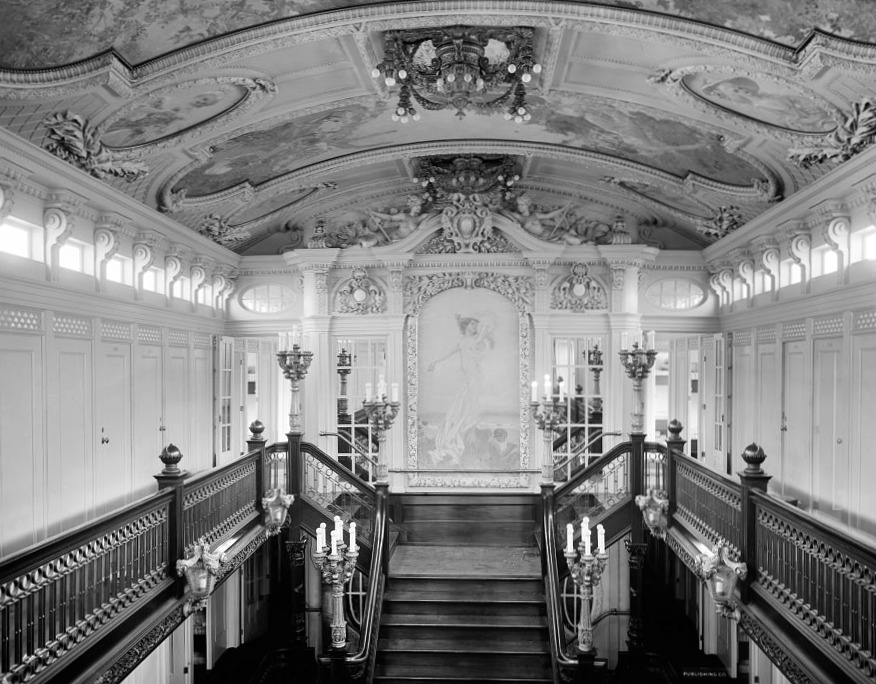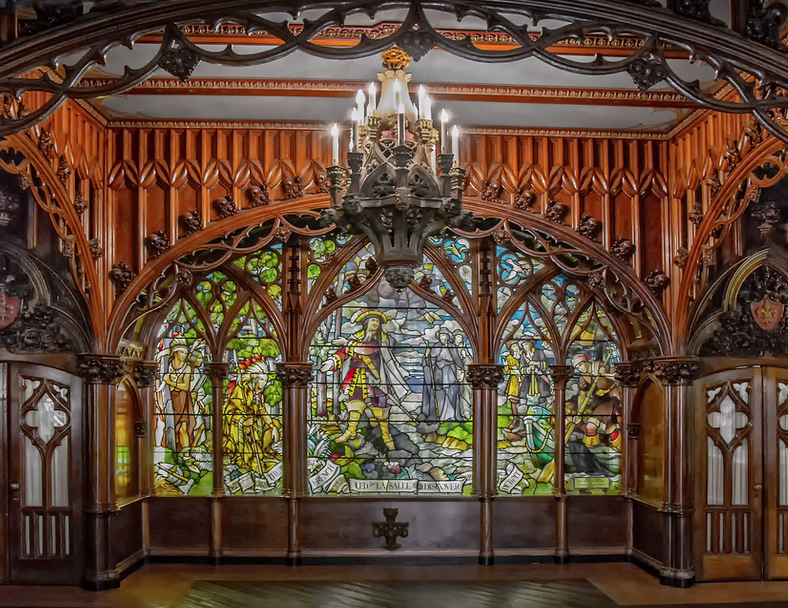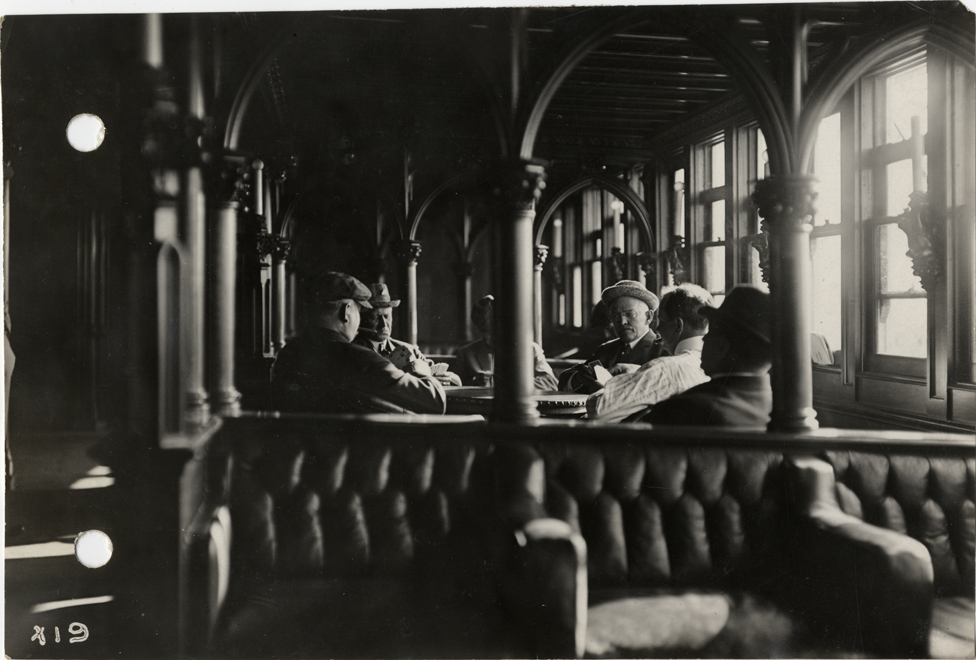

Too Beautiful to Disappear
Detroit, Michigan
by Dawn Woolcott
For the love of old ships
We have a love of ships and those romantic images of women in long dresses and fancy hats, gentlemen in their three piece suits all boarding a paddlewheeler or steamship at the turn of the century. The ships all had such elegance with exquisite craftsmanship and detailing. Carved wood, stained glass, deep rich colors – all fulfill that image in our heads of the romantic age of travel. It is no wonder that when a ship is destined to be headed to the ship graveyard, those that love architecture, and maritime history came together to rescue as much of that original detailing as possible. At the Dossin Great Lakes Museum in Detroit, you can step inside one of the rooms that was deemed too beautiful to disappear.
The City of Detroit III
The ship The City of Detroit III was a regular on the Great Lakes in the early 1900s, traveling frequently between Detroit and Cleveland, or Detroit and Buffalo. Transporting travelers on a day-long voyage that would have you in Cleveland by dinnertime, or on the Detroit-Buffalo route, departing soon after dinner and arriving early the following morning. Travel by ship was the most elegant way to travel – at a time when trains might have been faster but less comfortable, and cars yet to be widely used. The 470 foot ship was the largest serving the Great Lakes at the time, and owned by the Detroit and Cleveland Navigation Company. In building the ship, they had hired local painter and architect Louis O. Keil to create the interior decor. Keil created a stunning interior that rivaled the big ocean liners in many ways. This was a time ship builders were in a race to outdo each other, with the ultimate in luxurious interiors being built by the White Star Line on their ocean cruisers, the Olympic built in 1910 and the Titanic in 1912. The City of Detroit III was launched in between, in 1911 on a more modest scale – if you can call this stunning interior “modest.”

The interior of the City of Detroit was still extremely luxurious, with a ceiling in the main stairway that rivaled those found in a French chateau. The elegant public spaces included a palm court, a 17th century style Rhine wine cellar, a promenade deck built of the finest imported mahogany, several salons where men and women could enjoy their time – usually in separate rooms – a Marie Antoinette drawing room painted in gray tones and cerulean blue for the ladies and an opulent gentlemens lounge or smoking room, called “the Gothic Room.” It earned its name by using gothic design elements including carved English oak wood, a carved mantle over a fireplace, spacious settes, a pipe organ, and a stunning Tiffany stained glass window. The window featured an image of the French discovering Detroit led by the explorer LaSalle as the indiginous tribes look on from the side. It was heralded to be the most beautiful room ever to be installed in a ship.

The ship could carry 5,000 day passengers, although it usually carried far less – and could hold 1,500 overnight passengers. Once launched in 1911, workers began preparing the ship for passengers, building the decks and interior spaces. The ship officially took its first voyage on May 30, 1912 just over a month after the Titanic sank on April 15, 1912 and the sinking was fresh on the public’s mind. Despite the bad timing, the ship was incredibly popular and sailed the Great Lakes for decades. The ship had been built to serve the upper classes though, and as a result, the Great Depression took its toll when it hit in the thirties,. The shipping company ran at a loss for years, forcing a slow decline. Time and circumstances took control, and following WW2, the ship was well past its prime.

All good things come to an end
Time had finally taken its toll on the old ship, and in 1950 it was retired and destined for the scrap yard. In 1956 the ship was dismantled and workers tore every bit of wood off the vessel. But first they carefully removed the beautiful “Gothic Room” interior – rescuing the stained glass window and surrounding woodwork. The pieces were stored in a barn for ten years before enough money was raised by Detroit citizens and lovers of maritime history to purchase the pieces from its owner. After thousands of hours spent restoring and piecing back together the room, volunteers donated the room to the Dossin Great Lakes Museum. You can read more details about the history of the City of Detroit III on the Historic Detroit blog.

His own home needed rescue
In a similar twist of time, the architect-designer, Louis O. Keil’s own home needed a rescue as well. Recently a couple walking through an old neighborhood in Detroit fell in love with a beautiful old house but it was neglected and in a sad state of repair. They managed to purchase the home for just $12,000 and are busy spending plenty more trying to restore it to its original state. They discovered their new home was once owned by Louis O. Keil and feel privileged to bring the house back to life for their growing family.

Step inside the old Gothic Room yourself discovering the history of the Great Lakes by visiting Detroit on one of these cruises:
St. Lawrence Seaway and Great Lakes
Quebec City, QC to Milwaukee, WI
- 15 Nights
- September 19, 2025,September 18, 2026
- From $13,480
- Pearl Mist
Viking Great Lakes Explorer
Milwaukee to Thunder Bay
- 7 Nights
- May 26, 2025,June 24, 2025,September 1, 2025
- From $6,995
- Viking Octantis
Niagara & the Great Lakes-Viking Octantis
Toronto to Milwaukee
- 7 Nights
- April 22, 2025,April 29, 2025,May 6, 2025--
3 more dates available. - From $6,295
- Viking Octantis
Great Lakes and Georgian Bay Cruise
Toronto to Milwaukee
- 11 Nights
- May 23, 2025,June 3, 2025,July 12, 2025--
11 more dates available. - From $8,970
- Pearl Mist
Save this story to Pinterest:



